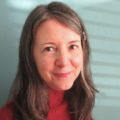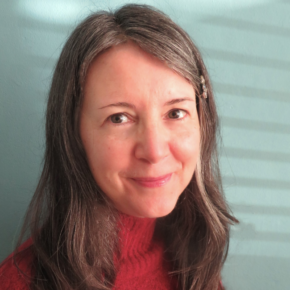I often say to people that if I’d known how hard it was to write a book, I’m not sure I would have started one! However, back in 2017, with absolutely no experience or knowledge of what it would take, I used some redundancy money to take a writing course with the Faber Academy – this was one of the Faber online courses devised and run by Professional Writing Academy.
I’d dabbled with writing for a while, but had no idea if I was any good and had never attempted a novel. My tentative first steps were a Beginning to Write course and this marked me taking my writing seriously for the first time. I enjoyed it so much that I then signed up quickly for the follow-on Writing a Novel course which aimed to get you to the first 15,000 words of your novel.
On both courses, I received lovely, supportive feedback from my tutor and from others taking my course that spurred me on to complete my first novel. It was much harder than I thought it would be to get to the point where I typed ‘The End’, but eventually I did and it went on to be longlisted for the Bath Novel Award and selected for Friday Night Live at the Festival of Writers in York.
After hearing about the huge success author Joanna Cannon had following her appearance as a finalist in the same competition (she had done the same online course!), I had very high hopes! I foolishly thought publication must be at my fingertips. I had great feedback but did not walk away with an agent. I did however have a brilliant time at the festival and learned a huge amount.
I continued to work on my novel and then when I was ready, took the scary step of submitting to agents. I pressed send on a handful of submissions, carefully tailored to my chosen agents and then checked my emails about five times a day for the next few weeks. Slowly, rejections trickled in and although some were kind and encouraging, I already felt like giving up.
However, I had attended talks from other writers who described the whole process to be a bit like dating. It really did have to be a perfect match – your agent had to wholeheartedly love your book, not just like it or think it was good. I also learned that there can be a huge amount of luck involved in the process, which didn’t fill me with much hope. However, it did help manage my expectations and I stopped obsessively checking my emails.
After some interest in my first novel, the excitement of receiving full requests resulted in nothing and I was deflated. I started another book and when I finished that, began querying again. I researched the agents of my favourite authors and read interviews with agents to get a feel for what they were interested in. I sent off small batches and if I received helpful feedback, I acted on it.
Each time I received a rejection, I sent out a new query, a way to keep the hope alive.
I kept telling myself, it would only take one agent, the right agent, for my book to have a chance of publication. It was just a matter of time and perseverance.
When I did find my agent, Lucy Balfour at WME Books, it was worth the wait because I had someone who loved my novel and who I knew would be a brilliant champion for it. By the time I signed, my book was a better version than the one I had at the start of the querying process, even though I’d felt it was polished and ready to go. It can take so long to hear back from agents that I found it helpful to keep busy by writing and learning as much as possible and editing my novel further.
Writing courses are helpful but more importantly, I’d recommend that you read widely, follow authors and industry professionals on social media and enter competitions.
Learn from feedback, listen to others, meet other writers at festivals and events to create a support network of like-minded people.
All these things are like small building blocks that allow you to refine your craft and find your tribe, keep you going when you really think you shouldn’t.
Most importantly, don’t give up. Give yourself time and space to get over any disappointments (more than likely there will be some). Go for long walks, eat chocolate for days and threaten to never write another word… but then, when you’re ready, start again. You may just find yourself with a publishing deal at the end of it all.
The Secret Collector, described as “a very real and heartwarming story about the life-changing power of friendship and found family,” is available now.






















